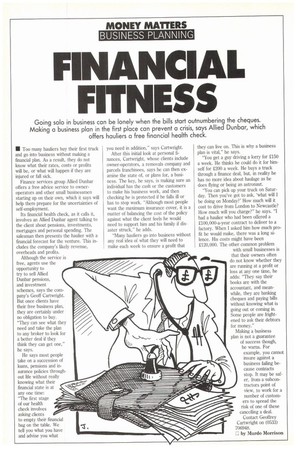FINANCIAL FITNESS
Page 38

If you've noticed an error in this article please click here to report it so we can fix it.
• Too many hauliers buy their first truck and go into business without making a financial plan. As a result, they do not know what their rates, costs or profits will be, or what will happen if they are injured or fall sick.
Finance services group Allied Dunbar offers a free advice service to owneroperators and other small businessmen starting up on their own, which it says will help them prepare for the uncertainties of self-employment.
Its financial health check, as it calls it, involves an Allied Dunbar agent talking to the client about pensions, investments, mortgages and personal spending. The salesman then presents the haulier with a financial forecast for the venture. This includes the company's likely revenue, overheads and profits.
Although the service is free, agents use the opportunity to try to sell Allied Dunbar pensions, and investment schemes, says the company's Geoff Cartwright. But once clients have their free business plan, they are certainly under no obligation to buy. "They can see what they need and take the plan to any broker to look for a better deal if they think they can get one," he says.
He says most people take on a succession of loans, pensions and insurance policies throughout life without really knowing what their financial state is at any one time: "The first stage of our health check involves asking clients to empty their financial bag on the table. We tell you what you have and advise you what you need in addition," says Cartwright.
After this initial look at personal finances, Cartwright, whose clients include owner-operators, a removals company and parcels franchisees, says he can then examine the state of, or plans for, a business. The key, he says, is making sure an individual has the cash or the customers to make his business work, and then checking he is protected if he falls ill or has to stop work. "Although most people want the maximum insurance cover, it is a matter of balancing the cost of the policy against what the client feels he would need to support him and his family if disaster struck," he adds.
"Many hauliers go into business without any real idea of what they will need to make each week to ensure a profit that they can live on. This is why a business plan is vital," he says.
"You get a guy driving a lorry for 2150 a week. He thinks he could do it for himself for 2200 a week. He buys a truck through a finance deal, but, in reality he has no more idea about haulage as he does flying or being an astronaut.
"You can pick up your truck on Saturday. Then you've got to ask, 'what will I be doing on Monday?' How much will it cost to drive from London to Newcastle? How much will you charge?" he says. "I had a haulier who had been offered a 2100,000-a-year contract to deliver to a factory. When I asked him how much profit he would make, there was a long silence. His costs might have been 2120,000. The other common problem
with small businesses is that their owners often do not know whether they are running at a profit or loss at any one time, he adds: "They say their books are with the accountant, and meanwhile, they are banking cheques and paying bills without knowing what is going out or coming in. Some people are frightened to ask their debtors for money."
Making a business plan is not a guarantee of success though, he warns. For example, you cannot insure against a business failing because contracts stop. It may be safer, from a subcontractors point of view, to work for a number of customers to spread the risk of one of these cancelling a deal. Contact Geoffrey Cartwright on (0533) 706948.
I: by Murdo Morrison














































































































